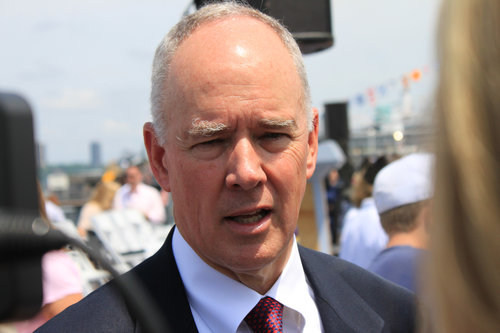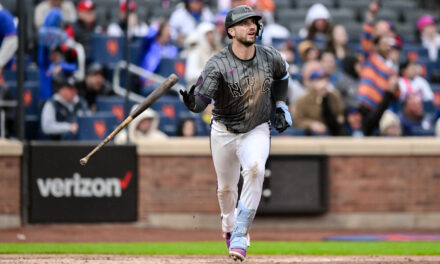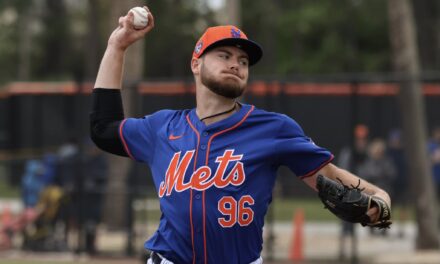 If you have a problem with Sandy Alderson, you have a problem with Major League Baseball. The Mets, as of 2010, have been essentially an MLB operation under virtual MLB oversight with Sandy Alderson a de facto appointee. His job, presiding over this financial and organizational overhaul, has one purpose — to facilitate profitability. That is why he was sent to Queens. Bud Selig does not care about Met fans, he doesn’t give a rat’s patooty about you or me or Paulie from Whitestone who has been attending Mets games since 1962.
If you have a problem with Sandy Alderson, you have a problem with Major League Baseball. The Mets, as of 2010, have been essentially an MLB operation under virtual MLB oversight with Sandy Alderson a de facto appointee. His job, presiding over this financial and organizational overhaul, has one purpose — to facilitate profitability. That is why he was sent to Queens. Bud Selig does not care about Met fans, he doesn’t give a rat’s patooty about you or me or Paulie from Whitestone who has been attending Mets games since 1962.
We have to remember that the Mets are a business and a franchise, that while their “brand” is the New York Mets, they also represent MLB and they were not about to allow the National League’s Gotham City franchise to sink into bankruptcy. No way, no how.
Alderson’s mission, was not to create a winning product in New York or to bring a World Series to Flushing, his mission was to put the NY Mets organization back on the path to profitability. That’s it, nothing else. Many of us lament the fact that Alderson let established stars depart, that he’s failed to exploit free agency — but these may very well be obsolete paradigms. Free agency is going to be greatly diminished in the coming years.
The most successful teams will be the teams who can develop a steady stream of talent from their minor league systems. Small market operations will get a leg up by utilizing legal devices designed to help them secure elite talent in the draft. Revenue sharing dollars for big markets? Gone. The practicality of the mid-season trade? History. What Alderson has essentially done is adapted the Mets to life under the new CBA ahead of just about every other major league club, while relegating almost a third of the 2014 budget to the “available but untapped” column.
If there is a benefit to having an MLB insider running our team, this is it. The Mets are going to be supremely adapted to life under current MLB operational parameters. You don’t like how the Mets have done business over the past few years? Get used to it, the Player’s Association signed a 5 year deal. Even the Yankees are scaling back and reassessing their approach.
Now I ask you this, what would be better, to adapt to these changes ahead of time (and ahead of other teams) or (like the Nats did in 2011) to take one last shot at using the old paradigm’s flexibility? If you aren’t currently in a position to contend I think the more prudent approach is the former.
 Alderson is not a player acquisition guy, he’s not a “baseball” guy … he’s a businessman and a lawyer. His job has been to overhaul the organization, to build a “lattice” if you will, one that will support the systems and operations (the vines) necessary to produce a quality on-field product (the fruit). The grape vine analogy is a good one because it demonstrates how far removed from the players Alderson really is. It’s really Paul DePodesta and J.P. Ricciardi who are in charge of the players — in fact it’s the scouts assembling the aggregate performance data and writing the detailed reports who do the “target acquisition” legwork.
Alderson is not a player acquisition guy, he’s not a “baseball” guy … he’s a businessman and a lawyer. His job has been to overhaul the organization, to build a “lattice” if you will, one that will support the systems and operations (the vines) necessary to produce a quality on-field product (the fruit). The grape vine analogy is a good one because it demonstrates how far removed from the players Alderson really is. It’s really Paul DePodesta and J.P. Ricciardi who are in charge of the players — in fact it’s the scouts assembling the aggregate performance data and writing the detailed reports who do the “target acquisition” legwork.
Alderson’s job was to rebuild this lattice, to restructure finances in support of the team’s systems and operations so the team could again make money. That’s it, that’s all he’s had to do. Slash, burn, and redistribute with a focus on the minors. That’s all he did in San Diego and that’s pretty much all he’s doing here. Does that make him a hatchet man? Maybe, if that’s what you want to call it.
Recently Alderson was asked whether his conversation with Johan Santana had “cleared the air,” whereupon he described a more nuts-and-bolts discussion, saying it centered on Santana’s workout plan.
“If that was clearing the air, that was clearing the air, I guess,” Alderson said.
He’s a bitter pill, I’ll admit, but a necessary one nevertheless. Nobody expects veteran players to like him, especially now that he has the legal framework to offset their worth by hugely increasing the value of cheap under control prospects. Do you think he cares that veteran players don’t like him? Do you think he’s worried that free agents might not want to come to NY? Is he acting like it? I don’t think he gives a damn. I think he’s seen the future and investing heavily in pricey veterans isn’t a big part of it. Who is going to win this tussle between veteran interests and Ownership? Baseball is a young man’s game and Alderson is not out to win any popularity contests. That’s not why he’s here. He’s here to fix the Mets structurally.
Whether or not the Mets win now or later really doesn’t matter in this respect. GM’s come and go, some are good and some stink. If DePo and Ricciardi stink and the Mets don’t succeed in the short term, well then hopefully they’ll be replaced by someone better. But the structure, the lattice, remains. If that structure is well-adapted, profitable, self-sustaining, then it will make any GM’s job that much easier. Think of it this way, what GM in his right mind wouldn’t want to run a team with a solid core of young inexpensive players, a vastly improved farm system stocked with a ton of quality pitching, and 40 million in spending money for 2014?
A quality farm promises to remain the primary feeder of major league talent for any successful organization, as such, the importance of its success is not just paramount, it is incalculable. Mitch Petanick in his article yesterday, pointed out how the Mets have some of the finest right-handed pitching prospects in the Minors. Our Florida State League A-ball affiliate (a big performance marker for our current front office strictly in terms of player turnover) last year went to their league championship with by far the best pitching and lowest ERA in their league. There is a wave of pitching heading our way that is larger and more promising than “Gen-K.” Matt Harvey and Zack Wheeler are just the beginning.
Fan support can be fickle, Met fans can be temperamental and impatient, we’ve had so much disappointment it’s hard to see a silver lining even when it’s obvious, but it’s hard not to feel good about the pitching heading our way and the amount of financial flexibility this team is going to enjoy come 2014.
I have a feeling we’re going to look back on Sandy Alderson’s tenure as a huge turning point.














